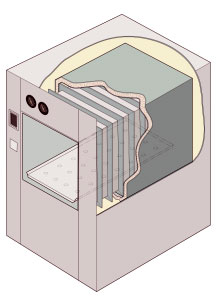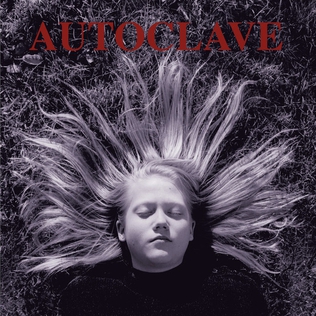Indie rock is a genre of rock music that originated in the United States and United Kingdom in the 1970s. Originally used to describe independent record labels, the term became associated with the music they produced and was initially used interchangeably with alternative rock. As grunge and punk revival bands in the US and Britpop bands in the UK broke into the mainstream in the 1990s, it came to be used to identify those acts that retained an outsider and underground perspective. In the 2000s, as a result of changes in the music industry and the growing importance of the Internet, some indie rock acts began to enjoy commercial success, leading to questions about its meaningfulness as a term.
Alternative rock is a style of rock music that emerged from the independent music underground of the 1980s and became widely popular in the 1990s. In this instance, the word "alternative" refers to the genre's distinction from mainstream rock music. The term's original meaning was broader, referring to a generation of musicians unified by their collective debt to either the musical style or simply the independent, DIY ethos of punk rock, which in the late 1970s laid the groundwork for alternative music. At times, "alternative" has been used as a catch-all description for music from underground rock artists that receives mainstream recognition, or for any music, whether rock or not, that is seen to be descended from punk rock.

Bratmobile was an American punk band. Bratmobile was a first-generation "riot grrrl" band, which grew from the Pacific Northwest and Washington state underground. It was influenced by several eclectic musical styles, including elements of pop, surf, and garage rock.
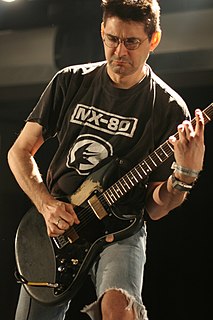
Math rock is a style of indie rock that emerged in the late 1980s in the United States, influenced by post-hardcore, progressive rock bands such as King Crimson, and 20th century minimal music composers such as Steve Reich. Math rock is characterized by complex, atypical rhythmic structures, counterpoint, odd time signatures, angular melodies, and extended, often dissonant, chords. It bears similarities to post-rock.

Cabaret Voltaire are an English music group formed in Sheffield in 1973 and initially composed of Stephen Mallinder, Richard H. Kirk, and Chris Watson. The group was named after the Cabaret Voltaire, the Zürich nightclub that served as a centre for the early Dada movement.

Galaxie 500 was an American alternative rock band that formed in 1987 and split up in 1991 after releasing three albums.
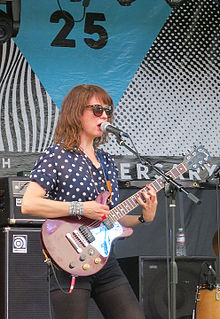
Mary Bozana Timony is an American independent singer-songwriter, guitarist, keyboardist, and violist. She has been a member of the bands Helium, Autoclave and Wild Flag, and currently fronts Ex Hex.

Autoclave was an American indie rock band, based in Washington, D.C. They were on local label Dischord Records. Formed in the summer of 1990, the group consisted of vocalist and bassist Christina Billotte, lead guitarist Mary Timony, guitarist Nikki Chapman, and drummer Melissa Berkoff.
Recursive recycling is a technique where a function, in order to accomplish a task, calls itself with some part of the task or output from a previous step. In municipal solid waste and waste reclamation processing it is the process of extracting and converting materials from recycled materials derived from the previous step until all subsequent levels of output are extracted or used.
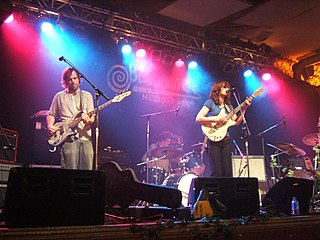
Land of Talk is a Canadian indie rock band formed in 2006 from Montreal, Quebec, Canada. The band is led by singer and guitarist Elizabeth Powell.
Biomedical waste is any kind of waste containing infectious materials. It may also include waste associated with the generation of biomedical waste that visually appears to be of medical or laboratory origin, as well research laboratory waste containing biomolecules or organisms that are many restricted from environmental release. As detailed below, discarded sharps are considered biomedical waste whether they are contaminated or not, due to the possibility of being contaminated with blood and their propensity to cause injury when not properly contained and disposed of. Biomedical waste is a type of biowaste.

Zero Cipher were a metal/rock/alternative band from Farnham, Surrey, England. The band formed in the year 1998 from members of other bands within their local area. They played a style of music that fuses metal, rock, and industrial, although they cite wide-ranging influences like Carcass, Wham, and Depeche Mode. Googlism describes them as "noisecore mixed with turntablism". They broke up in October 2009.

A waste converter is a machine used for the treatment and recycling of solid and liquid refuse material. A converter is a self-contained system capable of performing the following functions: pasteurization of organic waste; sterilization of pathogenic or biohazard waste; grinding and pulverization of refuse into unrecognizable output; trash compaction; dehydration. Because of the wide variety of functions available on converters, this technology has found application in diverse waste-producing industrial segments. Hospitals, clinics, municipal waste facilities, farms, slaughterhouses, supermarkets, ports, sea vessels, and airports are the primary beneficiaries of on-site waste conversion.
Nintendocore is a broadly defined music genre that fuses chiptune and video game music with modern hardcore punk and heavy metal and various associated rock music styles. The genre was pioneered by Horse the Band, The Advantage, and Minibosses.
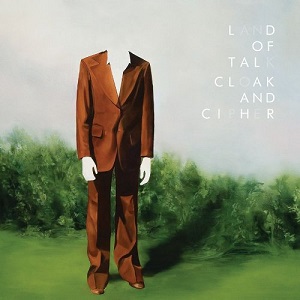
Cloak and Cipher is the second full-length album by Canadian indie rock band Land of Talk, released August 24, 2010, on Saddle Creek Records.

Wild Flag was an American four-piece indie rock/post-punk supergroup based in Portland, Oregon and Washington, D.C.. The group consisted of Carrie Brownstein, Mary Timony, Rebecca Cole and Janet Weiss, who are ex-members of the groups Sleater-Kinney, Helium and The Minders.
